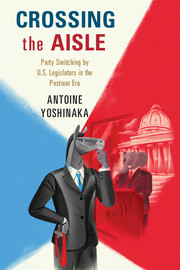Book contents
- Frontmatter
- Dedication
- Contents
- List of Tables
- List of Figures
- Acknowledgments
- PART I
- PART II
- PART III
- PART IV
- Appendix A Excluded “Pseudo-Switchers”
- Appendix B Details about Elite Interviews
- Appendix C Data Sources for Chapter 3
- Appendix D Data Sources for Chapter 4
- Appendix E Data Sources for Chapter 5
- Appendix F Data Sources for Chapter 6
- References
- Index
Appendix B - Details about Elite Interviews
Published online by Cambridge University Press: 05 December 2015
- Frontmatter
- Dedication
- Contents
- List of Tables
- List of Figures
- Acknowledgments
- PART I
- PART II
- PART III
- PART IV
- Appendix A Excluded “Pseudo-Switchers”
- Appendix B Details about Elite Interviews
- Appendix C Data Sources for Chapter 3
- Appendix D Data Sources for Chapter 4
- Appendix E Data Sources for Chapter 5
- Appendix F Data Sources for Chapter 6
- References
- Index
Summary
Between 2005 and 2009, I conducted interviews with thirteen members of Congress or their staff. In addition, I interviewed a state legislator who switched parties and a former county legislator who ran against a future congressional party switcher. I made attempts to interview three types of members of Congress (or their high-level staff): party switchers, party leaders, and potential switchers.
I considered a potential switcher any member with at least two confirmed reports of a potential switch or wooing efforts from the other party (from sources such as The Almanac of American Politics, Roll Call, The Hill, or print newspapers). These potential switchers were primarily southern Democrats and northeastern Republicans. While a reliance on media reports could potentially lead to some members being wrongfully included in the pool of nonswitchers, I relied on credible outlets and looked for information that could be verified in at least two sources. Moreover, none of the nonswitchers I interviewed denied having been approached to switch parties or having thought about it at some point.
My relatively low response rate (25.5 percent) precludes any kind of meaningful statistical analysis on the data collected from the interviews. Also, I do not claim to have a representative sample. My interviews are meant to provide a behind-the-scenes look into the role of leaders and other members in the decision to switch parties, a dynamic that cannot be easily observed from the outside. They are also critical in establishing the validity of some of my theoretical assumptions. Finally, they serve to supplement the quantitative portions of the book rather than provide additional data used to test some hypotheses derived from the theory.
Each interview was semistructured and lasted an average of about fifteen minutes. I promised each respondent anonymity and that I would treat their responses as “not for attribution.” A few respondents agreed to waive anonymity and be interviewed on the record. Nevertheless, I keep all interviews anonymous in order to maintain the confidentiality of all subjects. With a small pool of potential subjects, identifying some interviewees may lead to other subjects being identified simply by process of elimination. I also use the masculine pronoun to identify interview subjects throughout the book. Readers should not assume that this reflects a subject's gender.
- Type
- Chapter
- Information
- Crossing the AisleParty Switching by US Legislators in the Postwar Era, pp. 235 - 236Publisher: Cambridge University PressPrint publication year: 2015



